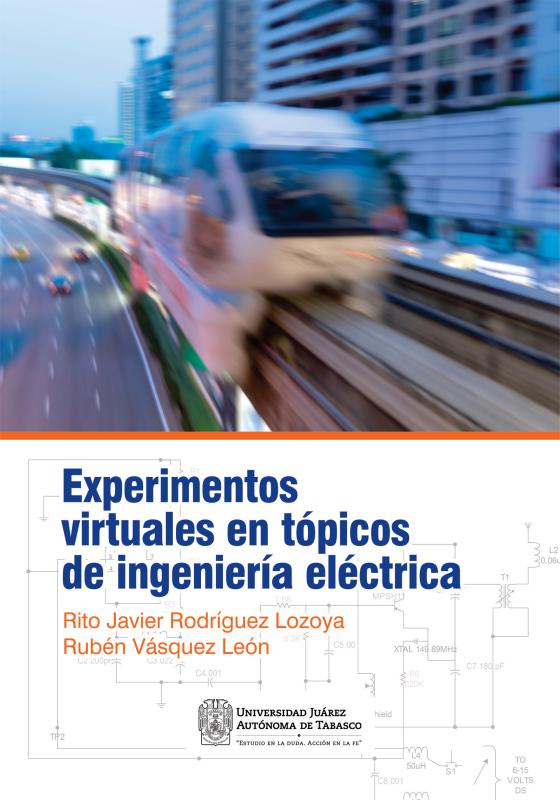Experimentos virtuales en tópicos de ingeniería eléctrica
Palabras clave:
ingeniería eléctrica, experimentos virtuales, laboratorio, electrical engineering, virtual experiments, laboratory, softwareSinopsis
En la actualidad la simulación por computadora se ha vuelto una herramienta bastante útil para todas las áreas del conocimiento. Una simulación es ventajosa cuando “imita” con mejor costo o menos recursos lo que acontece en un sistema real. En las áreas de ingeniería existen una gran variedad de software de simulación tanto comerciales como de libre acceso. Un software nos permite a los educadores promover una aprendizaje positivo con la interactividad del programa, atraer la atención del alumno lo cual refuerza el aprendizaje significativo, representar de manera aproximada sistemas reales que algunas veces son difíciles de implementar en el laboratorio convencional, además de que en el desarrollo de experimentos, no se requiere de instalaciones especiales, no hay costos por equipos, materiales, sustancias o consumo de energía, y es poco más flexible en el horario.
El propósito de este libro es presentar de manera sencilla algunos experimentos convencionales en temas de circuitos de corriente alterna, transformadores y máquinas eléctricas, que sean un complemento del laboratorio convencional, para el área de ingeniería eléctrica y que permitan una mayor familiaridad con estos dispositivos.
Virtual Experiments in Electrical Engineering Topics
Nowadays computer simulation has become a very useful tool for every area of knowledge. A simulation is advantageous when it "mimics" with lower cost or fewer resources what happens in a real system. In engineering areas there is a wide variety of simulation software, both commercial and available for free. Software allows educators to promote positive learning with program interactivity, to appeal student's attention which reinforces meaningful learning, to represent in approximated fashion real systems that may be difficult to implement in a conventional laboratory. In addition, while developing experiments with computer simulation, no special facilities are required, there are no additional costs for equipment, materials, substances or energy consumption, and it is more flexible for schedules.
The purpose of this book is to present in a plain way some conventional experiments on topics of alternating current circuits, transformers and electrical machines, which may complement the conventional laboratory, for the electrical engineering area, and may allow deeper familiarity with these devices
Descargas
Referencias
Alexander, Ch. K., Sadiku, M. N. O. Fundamentals of Electric Circuits 5th Ed. USA: McGraw Hill, 2013.
Aysun, S., Nwankpa. Transformers test using Matlab/Simulink and their integration undergraduate electric machinery courses. Comput Appl Eng Educ. 2006, 142 – 150.
Cathey, J. Jimmie. Máquinas Eléctricas. Análisis y diseño aplicando Matlab. México: McGraw Hill 2001.
Chapman, S. J., Máquinas Eléctricas 5a Ed. México: McGraw Hill, 2012.
Fitzgerald, A.E., Kingsley,Ch, Jr. Umans, S. D. Electric Machinery 6th Ed. USA: McGraw Hill, 2003.
Fraile, J. Mora.Máquinas Eléctricas. 6a Edición. España: McGraw Hill 2008.
Harris, S. T. Circuits Analysis I with MATLAB Computing and Simulink/SimPowerSystems Modeling 10th Ed. USA: Orchad Publications. www.orchadpublications.com. 2009.
Harris, S. T. Circuits Analysis II with MATLAB Computing and Simulink/SimPowerSystems Modeling 10th Ed. USA: Orchad Publications. www.orchadpublications.com. 2009.
Hayt, H. William, Kemmerly E. Jack, Durban, M Steven. Análisis de Circuitos en Ingeniería. 7ª Ed. México: Mcgraw Hill Interamericana. 2007.
Irwin, J. D., Nelms, R. M. Basic Engineering Circuits Analysis 10th Ed. USA: Wiley, 2010.
Nilsson, J. W., Riedel, S. A. Electric Circuits 9th Ed. USA: Prentice Hall, 2009.
Nwodo, T. C., Okoro, O. I. Simulation tools for electrical machines modelling: teaching and research. Nigerian Journal of Technology, Vol. 24, No 1, 2005, 33 – 37.
Personal Lab –Volt. Manual de Prácticas de Circuitos de Potencia y Transformadores, Manual del estudiante, 2ª Ed. Canadá: Lab-Volt LTD, 1995.
Personal Lab –Volt. Manual de Prácticas de Motores y generadores cc/ca, Manual del estudiante, 2ª Ed. Canadá: Lab-Volt LTD, 2000.





